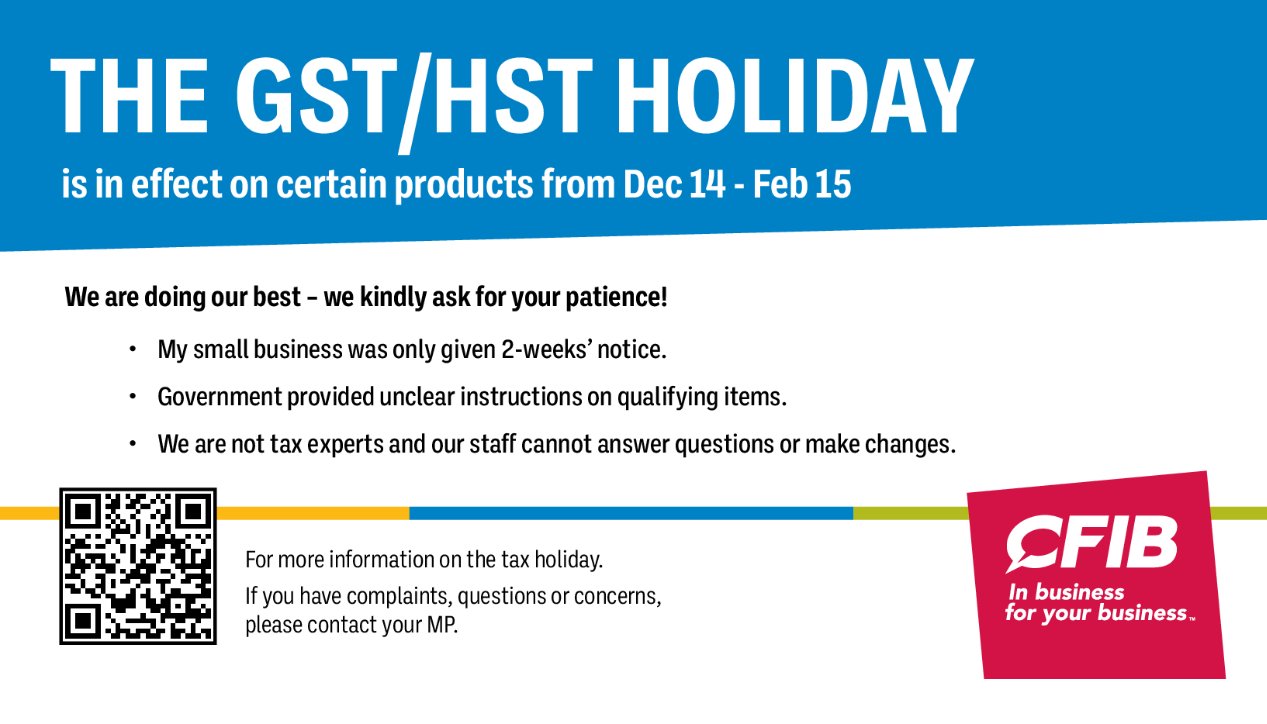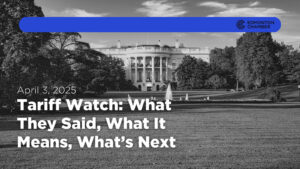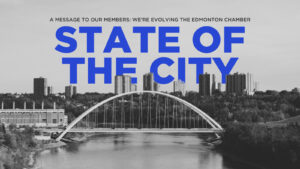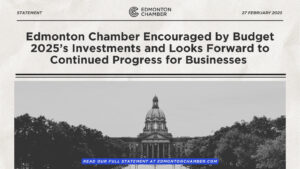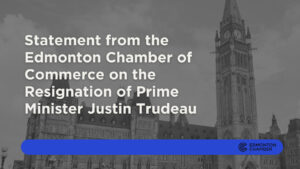December 9, 2024
Holiday Gift or Economic Lump of Coal?
The Edmonton Chamber’s Economic Analysis of the Newly Announced GST Holiday Tax Break .
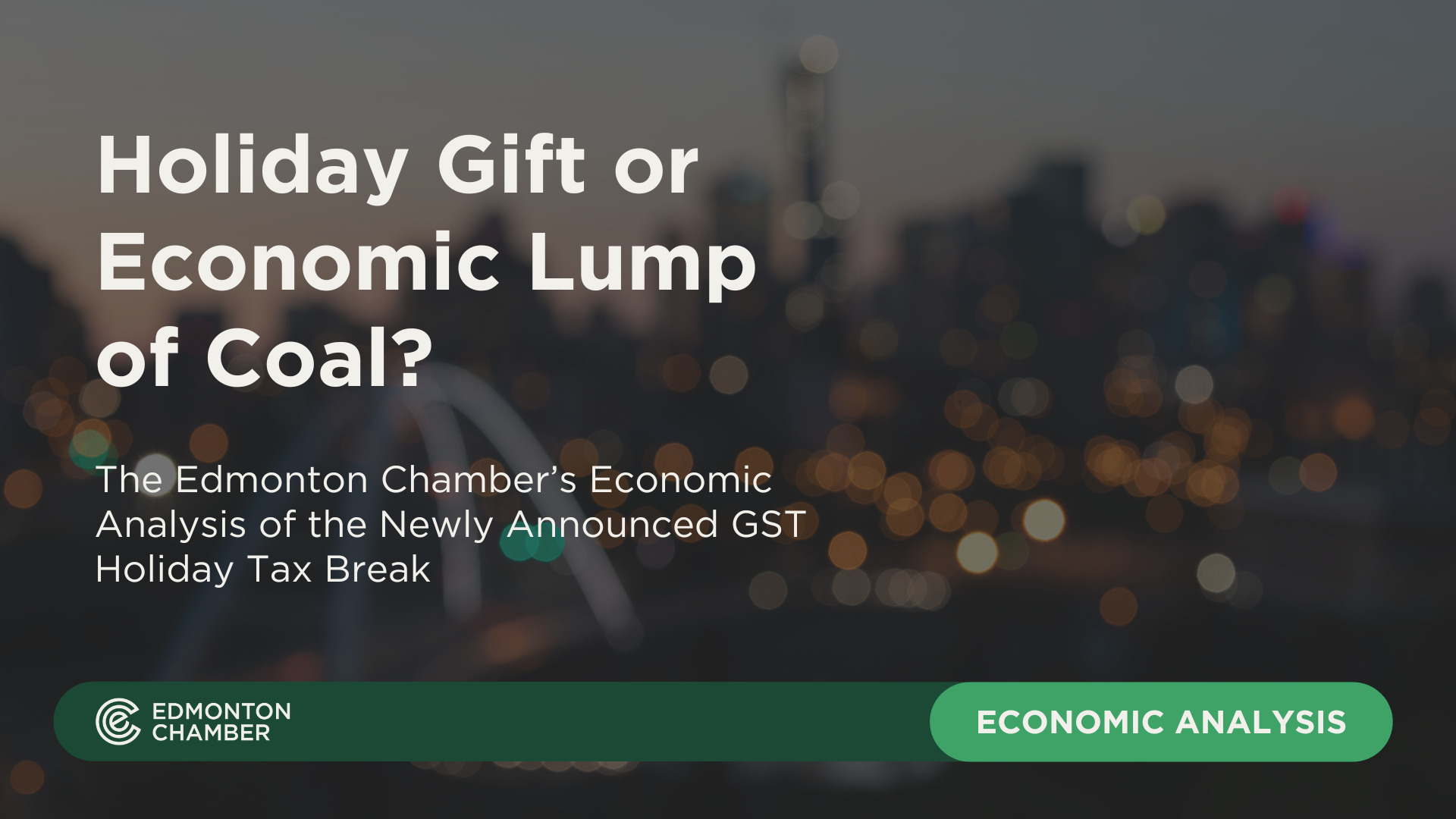
by Heather Thomson, Vice President of Economy & Engagement
No, Canada, Christmas is not coming early. The federal government is trying to play Santa this year, promising a GST-free holiday beginning December 14, as a supposed gift to alleviate the cost-of-living crunch. On paper, it sounds enticing—a temporary tax break on toys, books, meals, and even beer and wine. But this seasonal surprise feels more like an economic sleight of hand than meaningful relief for Canadians.
The holiday cheer comes with a hefty price tag: $6 billion in foregone revenue, including $1.6 billion from the tax break itself and the dangling promise of $250 rebate cheques to 18.7 million Canadians. As generous as it seems, taxpayers will be footing the bill long after the holiday lights dim.
The Upside: Short-Term Relief
To give credit where it’s due, the GST holiday and rebate would inject spending power into Canadian households. Local businesses, particularly restaurants and food-service establishments, could benefit from increased consumer activity. For some, it might ease financial pressures, especially during the high-spending holiday season. When it comes to the household rebate cheque promised, you should spend that in your local economy; avoid shopping online and let's try to inject that money back into Canadian markets.
The Downside: Disproportionate and Disruptive
However, the structure of this GST holiday raises concerns. It disproportionately benefits higher spenders, leaving middle- and lower-income Canadians—those the measure claims to help—receiving comparatively less. Big box stores will likely benefit more than mom-and-pop outlets as consumers bulk buy newly GST-free items such as children’s diapers, chips, candies, pop, juice boxes, and granola bars – not to mention beer and wine.
A Logistical Headache for Small Businesses
Then there are the headaches for retail businesses that will have to reprogram their systems to remove the GST on the government’s selected items as of Dec. 14 and then reverse that when the program ends after Feb. 15.
Even figuring out exactly which items are exempt could also be problematic given the government’s list that is both extensive and at times vague. For example, is a child’s everyday running shoe deemed to be “of a class that is used exclusively in sports” and therefore taxed?
The headaches for businesses include the very real threat that consumers will now put off Holiday purchases until Dec. 14 even though retailers have brought in stock and scheduled staff for what is now supposed to be the shopping season.
It promises to be an administrative and logistical nightmare especially when you consider that many retailers run their business using a shipping-on-demand model where they don’t have space to store merchandise.
While promising to make consumer life a little easier during the Holiday Season, the federal government is making a muddle of things for retailers.
Missed Opportunities for Targeted Relief
The rebate program, though postponed, is equally flawed. Seniors, people with disabilities, and those on fixed incomes—groups excluded from this rebate—are left out in the cold.
Economists warn that this dual measure might complicate inflation dynamics. While GST relief could marginally lower inflation, the rebates risk doing the opposite, potentially prolonging high interest rates and delaying economic stability.
Benjamin Reitzes, managing director of Canadian rates at BMO Economics, said he is assuming "a good chunk of the stimulus cheques will be saved but the GST/HST rebate will drive additional spending."
In a recent statement, the Canadian Federation of Independent Business pointed out that while the tax holiday will be welcomed by restaurants and food-service businesses, it “may add confusion and complexity for general retailers with both taxable and new exempt items” and “some small manufacturers and retailers will undoubtedly question why they are excluded from the exemption. It is hard to explain to a small producer of spirits why their products are taxed while other alcoholic beverages are not.”
The CFIB says a much better way to help Canadians and Canadian businesses is permanent tax relief.
The $250 “Working Canadians Rebate” is up in the air for now. Under the federal government’s initial plan, the rebate will be a bonus for an estimated 19 million Canadians. The fact that it’s to be given to any worker who earned up to $150,000 net income in 2023 tends to undermine any argument that the program is targeting working class families struggling to make ends meet.
While economists say GST relief may lower inflation, the stimulation cheques raise the risk of increasing inflation. And the government’s actions might mean the Bank of Canada won’t lower interest rates as quickly or as deeply as anticipated.
Political Overtones
The timing and design of this package suggest more than fiscal policy at play. With an estimated federal election on the horizon, this "gift" risks being perceived as a strategic maneuver to curry favor with voters. A more equitable approach, such as enhancing the GST credit for low-income Canadians or narrowing the rebate’s eligibility criteria, would have demonstrated genuine intent to support those who need it most.
Canada deserves better than temporary fixes that mask long-term challenges. True affordability measures require thoughtful planning, targeted support, and a commitment to addressing systemic issues—not just festive gifts that leave Canadians with a New Year’s fiscal hangover.
For sustainable relief, policymakers should explore permanent solutions that balance support for vulnerable populations with economic growth. Until then, this GST holiday may feel more like a seasonal mirage than a meaningful solution.
Have your say.
The Edmonton Chamber wants to hear from you. What are the top issues and priorities for your business? Start the conversation by writing to policy@edmontonchamber.com

